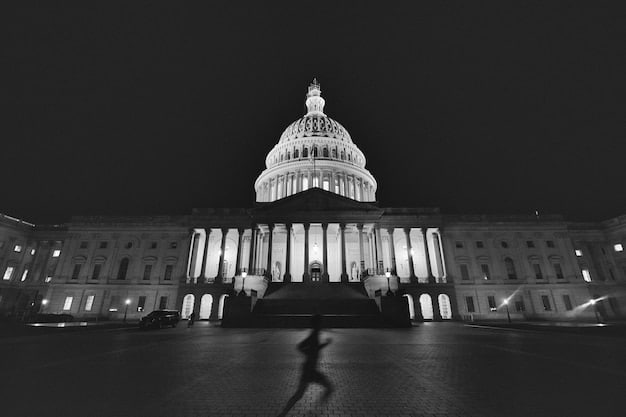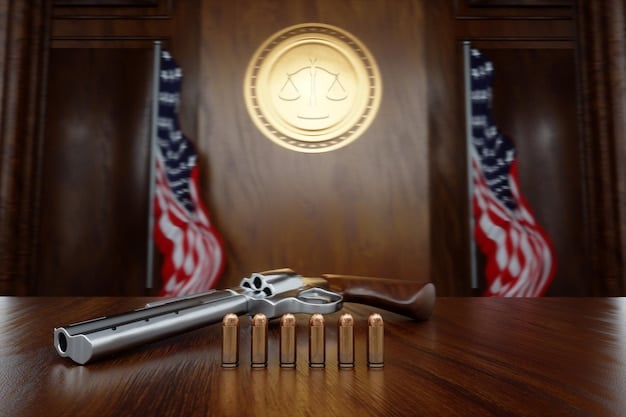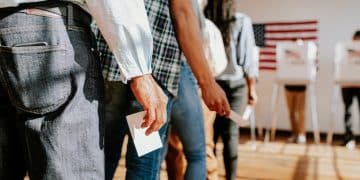Analyzing Gun Control Legislation: New Laws in Congress

Analyzing the Current Debate on Gun Control Legislation: What New Laws are Being Considered in Congress? focuses on potential federal legislative actions, including universal background checks, restrictions on assault weapons, and red flag laws, amid ongoing debates and varying levels of public and political support.
The debate around gun control in the United States is a long-standing and complex issue. This article delves into analyzing the current debate on gun control legislation: what new laws are being considered in Congress? providing an overview of the proposed measures, their potential impacts, and the political landscape surrounding them.
Understanding the Current Landscape of Gun Control in the U.S.
The gun control debate in the U.S. is shaped by deeply held beliefs about the Second Amendment, public safety concerns, and varying interpretations of data on gun violence. Understanding this landscape involves acknowledging the diverse perspectives and the passionate advocacy on both sides of the issue.
Current federal laws regulate aspects like background checks for firearm purchases from licensed dealers, restrictions on certain types of weapons, and prohibitions for specific individuals (e.g., convicted felons) from owning guns. However, state laws vary widely, with some states having much stricter regulations than others.
The Second Amendment and Gun Ownership
The Second Amendment plays a central role in the gun control debate. It states, “A well regulated Militia, being necessary to the security of a free State, the right of the people to keep and bear Arms, shall not be infringed.” Interpretations of this amendment range from the right to own any firearm without restriction to the right being limited to militia members.
Impact of Gun Violence on American Society
Gun violence is a significant problem in the United States, with tragic consequences for individuals, families, and communities. Mass shootings, homicides, suicides, and accidental deaths contribute to the overall toll of gun-related incidents. The debate surrounding gun control often intensifies following high-profile shooting events.
- The frequency and severity of mass shootings have increased in recent years.
- Suicide rates involving firearms are a major concern, particularly in rural areas.
- Urban areas experience disproportionately high rates of gun-related homicides.
- Accidental shootings, especially involving children, are a preventable tragedy.
The current landscape is marked by a renewed push for federal legislation, driven by public concern and advocacy groups. Proposed laws aim to address perceived gaps in existing regulations and reduce gun violence.
Key Gun Control Legislation Currently Under Consideration
Several key pieces of gun control legislation are being considered in Congress. These bills represent a range of approaches, from expanding background checks to restricting certain types of firearms. Understanding the specifics of each proposed law is crucial to analyzing the current debate.
These legislative proposals reflect a growing sense of urgency to address gun violence and a willingness among some lawmakers to pursue stricter regulations.

Universal Background Checks
One of the most widely debated proposals is the expansion of background checks to all firearm sales, including those between private individuals. This measure aims to close loopholes that allow individuals prohibited from owning guns to purchase them through unregulated channels.
Assault Weapons Ban
Another significant proposal is a ban on assault weapons, which are defined as semi-automatic firearms with specific military-style features. Proponents argue that these weapons are designed for combat and have no place in civilian hands. Opponents contend that such bans infringe upon the Second Amendment rights of law-abiding citizens.
- Assault weapons bans typically target specific firearm models and features.
- The definition of “assault weapon” can vary, leading to legal challenges.
- Proponents argue that these weapons are disproportionately used in mass shootings.
- Opponents claim that bans are ineffective and do not deter crime.
Red Flag Laws
Red flag laws, also known as extreme risk protection orders, allow law enforcement or family members to petition a court to temporarily remove firearms from individuals deemed a danger to themselves or others. These laws are intended to prevent tragedies by intervening before a person commits violence.
These specific pieces of legislation represent a proactive approach and an active role by the congress.
The Political Dynamics Shaping the Gun Control Debate
The gun control debate is heavily influenced by political dynamics, including partisan divisions, lobbying efforts, and public opinion. Understanding these factors is essential to comprehending the challenges and opportunities for legislative action.
The success or failure of gun control legislation often hinges on the balance of power in Congress and the ability of lawmakers to bridge partisan divides. Public opinion, while generally favoring some form of gun control, is not always a decisive factor.
Partisan Divisions
Gun control is a highly partisan issue, with Democrats generally supporting stricter regulations and Republicans often defending gun rights. This divide makes it difficult to achieve bipartisan consensus on legislative solutions.
Lobbying Efforts
Lobbying groups on both sides of the issue exert significant influence on lawmakers. The National Rifle Association (NRA) is a powerful advocate for gun rights, while organizations like Everytown for Gun Safety and Giffords Law Center push for stricter gun control measures.
These lobby groups use their influence to promote or block gun control legislation based on their respective agendas.
Public Opinion
Public opinion on gun control is complex and nuanced. While a majority of Americans support some form of gun control, there is significant disagreement on the specifics. Attitudes vary by demographics, geographic location, and personal experiences.
- Support for universal background checks is consistently high across party lines.
- Opinions on assault weapons bans are more divided.
- Red flag laws have gained bipartisan support in some states.
- The intensity of feeling on both sides of the issue makes it difficult to find common ground.
Political dynamics are very important in analysing the viability and possible success of any new law being considered.
The Role of Data and Research in Informing Gun Control Policies
Data and research play a crucial role in informing gun control policies. Understanding the patterns, causes, and consequences of gun violence is essential for developing effective interventions. However, there is often disagreement on the interpretation and application of research findings.
Scientific studies, statistical analyses, and data-driven insights can help policymakers make evidence-based decisions. However, the politicization of gun violence research can hinder progress.

Analyzing Gun Violence Statistics
Analyzing gun violence statistics is essential for understanding the scope and nature of the problem. Data on homicides, suicides, accidental deaths, and mass shootings can reveal important trends and patterns.
Research on the Causes of Gun Violence
Research on the causes of gun violence aims to identify the factors that contribute to gun-related incidents. Studies explore the role of mental health, access to firearms, socioeconomic factors, and cultural influences.
- Mental health is a complex factor, with a small percentage of gun violence directly attributable to mental illness.
- Access to firearms is a significant risk factor, particularly in suicides and accidental shootings.
- Socioeconomic factors, such as poverty and inequality, can contribute to gun violence.
- Cultural influences, including media exposure and social norms, may play a role.
Evaluating the Effectiveness of Gun Control Measures
Evaluating the effectiveness of gun control measures is crucial for determining whether they achieve their intended goals. Studies assess the impact of specific laws and policies on gun violence rates, crime statistics, and public safety outcomes.
Data and research can provide insight with an non-biased view point to help make better policies.
The Potential Impact of New Gun Control Laws on Communities
New gun control laws have the potential to significantly impact communities, both in terms of public safety and individual rights. Understanding these potential impacts is crucial for evaluating the costs and benefits of proposed measures.
The effects of stricter gun control laws are likely to vary depending on the specific provisions and the context in which they are implemented. Some communities may experience a reduction in gun violence, while others may face challenges related to enforcement and compliance.
Potential Benefits
Proponents argue that stricter gun control laws can lead to a reduction in gun violence, saving lives and preventing injuries. They point to studies that suggest a correlation between stronger gun laws and lower rates of gun-related deaths.
Potential Challenges
Opponents argue that stricter gun control laws can infringe upon the Second Amendment rights of law-abiding citizens. They raise concerns about the potential for government overreach and the impact on legal gun owners.
- Some argue that gun control laws are ineffective and do not deter criminals.
- Others express concerns about the cost and feasibility of implementing new regulations.
- There are also debates about the potential for unintended consequences, such as the creation of a black market for firearms.
Balancing Public Safety and Individual Rights
Finding a balance between public safety and individual rights is a central challenge in the gun control debate. Policymakers must consider the potential impacts of new laws on both sides of the issue and strive to find solutions that respect constitutional principles while addressing the problem of gun violence.
There are many things to consider when weighing the impact on communities.
The Future of Gun Control Legislation in the United States
The future of gun control legislation in the United States is uncertain, but the debate is likely to continue in the coming years. Several factors will shape the direction of policy, including public opinion, political dynamics, and the ongoing toll of gun violence.
The outcome of future legislative efforts will depend on the ability of lawmakers to find common ground and address the complex challenges surrounding gun control.
Potential Scenarios
Several potential scenarios could play out in the future. Congress could pass comprehensive gun control legislation, such as universal background checks or an assault weapons ban. Alternatively, lawmakers could focus on more targeted measures, such as red flag laws or funding for mental health services.
The Role of Advocacy Groups
Advocacy groups will continue to play a key role in shaping the gun control debate. Organizations on both sides of the issue will lobby lawmakers, mobilize public support, and advocate for their respective policy goals.
- The NRA will likely continue to defend gun rights and oppose stricter regulations.
- Everytown for Gun Safety and Giffords Law Center will advocate for stronger gun control measures.
- Other organizations, such as the Brady Campaign to Prevent Gun Violence, will work to raise awareness and promote policy changes.
The Importance of Bipartisan Dialogue
Finding common ground on gun control will require bipartisan dialogue and a willingness to compromise. Lawmakers must engage in respectful conversations with each other, listen to different perspectives, and seek solutions that address the concerns of all stakeholders.
The future of gun control legislation will hopefully strike the right balance and consider every point of view.
| Key Aspect | Brief Description |
|---|---|
| 🔍 Universal Background Checks | Expands background checks to all gun sales, closing loopholes. |
| 🛡️ Assault Weapons Ban | Prohibits the sale and possession of military-style assault weapons. |
| 🚩 Red Flag Laws | Allows temporary removal of guns from individuals deemed a threat. |
| 📊 Data & Research | Informs policy with statistics, causes, and effectiveness evaluations. |
Frequently Asked Questions
▼
Universal background checks require all gun sales, including those between private citizens, to go through the National Instant Criminal Background Check System (NICS) to prevent prohibited individuals from acquiring firearms.
▼
An assault weapon ban prohibits the sale, manufacture, and possession of certain semi-automatic firearms with military-style features that are deemed particularly dangerous. The definition can vary by law.
▼
Red flag laws, or extreme risk protection orders, allow law enforcement or family members to petition a court to temporarily remove firearms from individuals who pose a significant threat to themselves or others.
▼
The Second Amendment to the United States Constitution protects the individual right to keep and bear arms, playing a central role in the gun control debate with many views on how this right can be used.
▼
Advocacy groups, such as the NRA and Everytown, lobby lawmakers, raise public awareness, and mobilize support for or against gun control policies, helping to shape the debate and push for their goals.
Conclusion
Analyzing the current debate on gun control legislation in Congress reveals a complex interplay of legal, political, and social factors. The proposals under consideration, including universal background checks, assault weapons bans, and red flag laws, reflect ongoing efforts to balance public safety with individual rights in a nation deeply divided on the issue.





